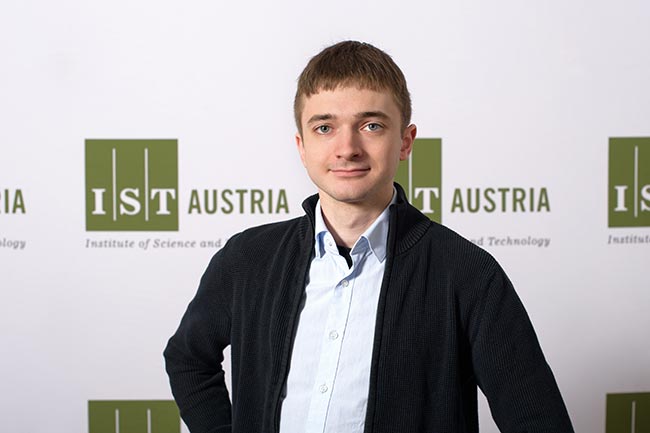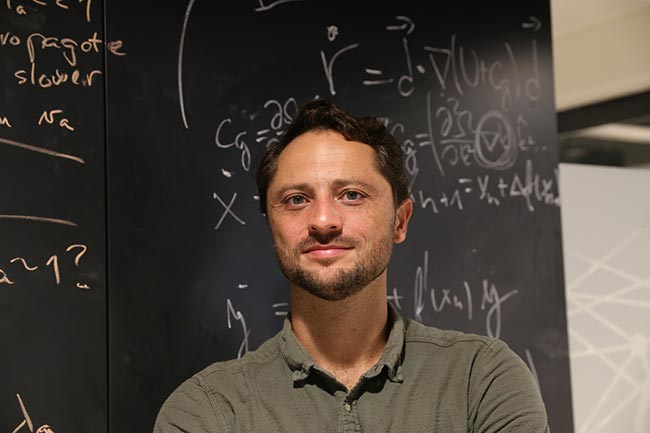September 3, 2020
Two ERC Starting Grants for IST Professors Julian Fischer and Scott Waitukaitis
The European Research Council (ERC) has awarded the Institute of Science and Technology Austria (IST Austria) two grants for frontier research set to improve our understanding of understanding of tribocharging and explore the role of randomness in multiscale problems in physics and mechanics.
Two IST Austria professors — Julian Fischer and Scott Waitukaitis— have been awarded between € 1.1 and € 1.5 million each by the European Research Council (ERC) to do fundamental research into the physical mechanisms that lead to tribocharging and to investigate largely unexplored aspects of multiscale PDEs. The two grants serve as part of the ERC’s ‘Starting Grant’ initiative designed to support future research that has the potential to contribute to major scientific breakthroughs.
Improving the science of both these areas not only has ramifications for the deeper understanding of the role of randomness in multiscale PDEs, but also could impact new technologies like triboelectric nanogenerators.
Julian Fischer: Bridging Scales in Random Materials

Many materials in nature and engineering are heterogeneous when viewed on a microscopic scale, yet behave like a homogeneous material on everyday length scales. In most such materials, these microscopic heterogeneities form a complex random pattern. The goal of Fischer’s project is to obtain a deeper mathematical understanding of the role of randomness in multiscale problems in physics and mechanics, answering questions like: How do the random small-scale structure and the nonlinear behavior of the material work together to give rise to a homogeneous effective behavior on everyday length scales?
Julian Fischer explains: “To name a specific example, we will investigate how fractures propagate in random materials. Besides deriving effective macroscopic models for fracture in such materials, we will analyze mathematical descriptions for the roughness of fractures that propagate through the random heterogeneities. Our mathematical analysis of random media will enable us to improve the efficiency of numerical simulation schemes and assess their reliability.”
Another aspect of interest in the framework of the project is the stabilizing effect of randomness on the evolution of microstructures: In general, the evolution of microstructures in materials may depend sensitively on the initial configuration, making a reliable numerical approximation impossible. Fischer and his team will develop numerical schemes that are reliable for “random” – i.e. for most – initial configurations.
In 2017 Julian Fischer became an Assistant Professor at IST Austria at the age of 27, after he had finished his PhD at the University of Erlangen – Nürnberg in 2013 and two postdoc positions at the University of Zurich, Switzerland and the Max Planck Institute for Mathematics in the Sciences, Leipzig.
Scott Waitukaitis: Tribocharge: a multi-scale approach to an enduring problem in physics

Although well-known to anyone who has been shocked by a doorknob and described scientifically going back as far as ancient Greece, the underlying mechanism for tribocharging—the exchange of electrical charge between objects during contact—remains a mystery. Even the identity of the species transferred, i.e. electrons vs. ions, is in most circumstances unknown. Recent results suggest that tribocharging might result from the transfer of hydroxide ions from nanoscale islands of adsorbed water, which are present on virtually all surfaces. Using atomic force microscopy to characterize surfaces and cutting-edge techniques to measure charge exchange, a major goal of Scott’s ERC is to validate or nullify this hypothesis and help resolve the millennia-old mystery behind tribocharging.
Scott Waitukaitis explains the difficulty of the ERC Starting Grant project Tribocharge: “Facing a problem that has eluded description for centuries is inherently risky. However, a truly multi-scale approach toward understanding tribocharging in a single laboratory has not been attempted. Our experiments will bridge the everyday macroscopic behaviors to the puzzling stochastic features of the mesoscale, and ultimately address the individual charge carriers one by one on the surface. Beyond fundamental relevance, our work may be helpful in new technologies, e.g. triboelectric nanogenerators, which so far use the effect without fundamental strategies for optimization.”
Scott Waitukaitis obtained his PhD in physics from the University of Chicago, USA in 2013. From 2013 to 2016 he joined Leiden University as a postdoctoral scholar, before moving to Amsterdam where he worked at AMOLF as a Veni Fellow. Since 2019, Professor Waitukaitis has led The Soft and Complex Materials Laboratory at IST Austria.
ERC at IST Austria
Awards, honors, and distinctions are an important metric for measuring research excellence. The most prestigious grants for basic science on the European level are awarded by the European Research Council (ERC). Set up in 2007 by the European Union, the ERC is the first pan-European funding organization for frontier research. It aims to stimulate scientific excellence in Europe by encouraging competition for funding between the very best, creative researchers of any nationality and age. With almost 48%, IST Austria has by far the highest success rate of ERC Grants in Europe of institutes with more than 30 grants.



